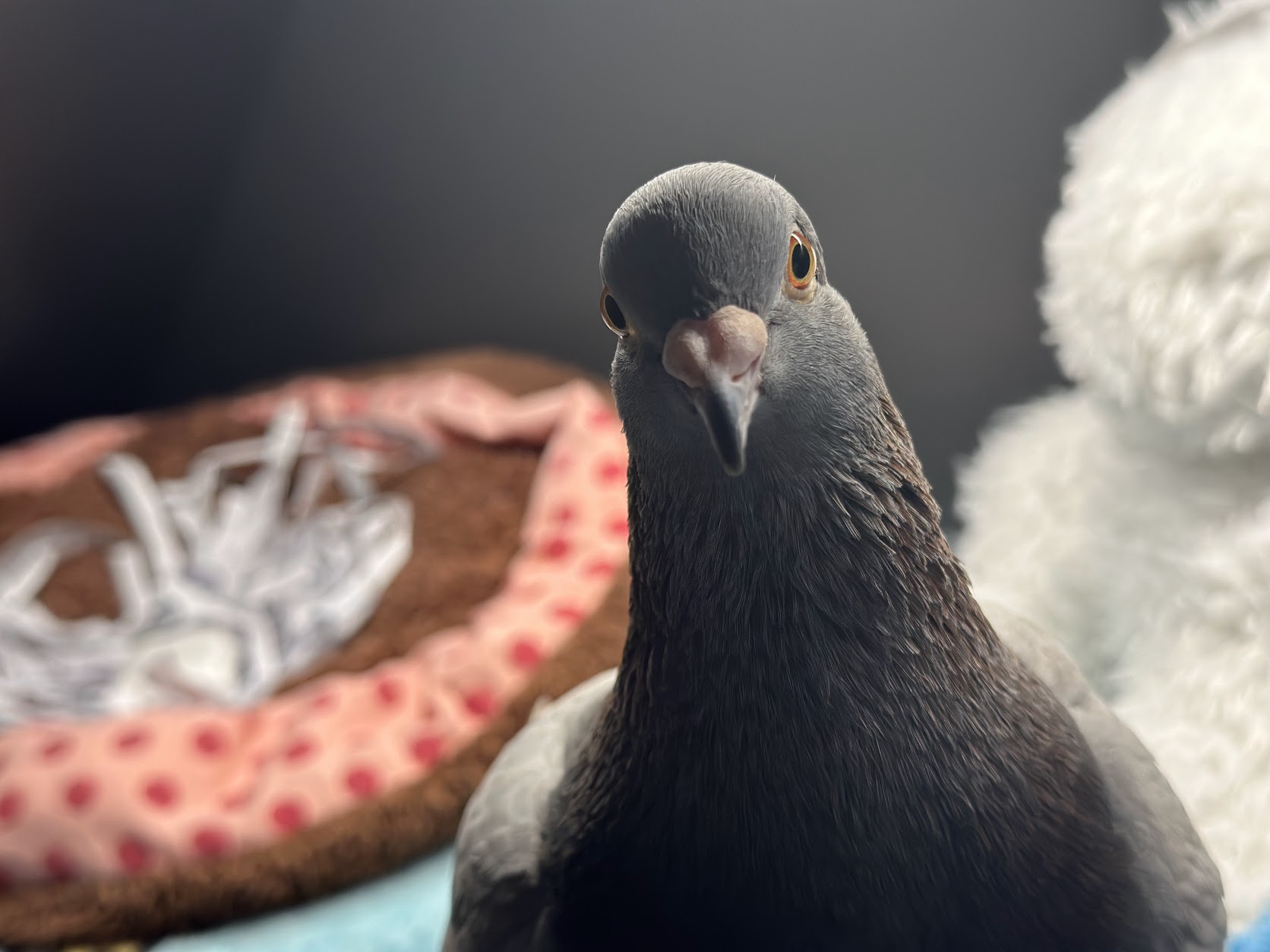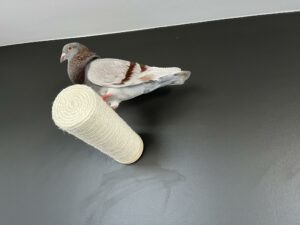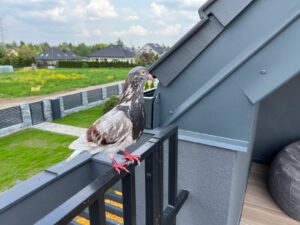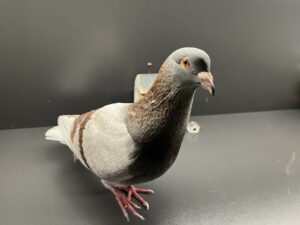Why do pigeons coo? Read on to learn all about pigeon cooing!
With their graceful flight, striking feathers, and unique cooing sounds, it’s no wonder that these pigeons have inspired poets, artists, and birdwatchers alike.
Most people and definitely pigeon owners are familiar the with sounds pigeons make in general or at least the sound their pigeon makes. People living in cities get to hear pigeons every day.
As a lifelong pigeon enthusiast and the proud owner of my own feathered friend, I have always been fascinated by the unique cooing sounds that these birds make.
But why do pigeons coo, and what do these vocalizations mean? But what is it about pigeon cooing that makes it so special, and what does it mean?
In this article, I will explore the purpose, anatomy, and cultural significance of pigeon cooing to gain a deeper understanding of these mysterious birds.
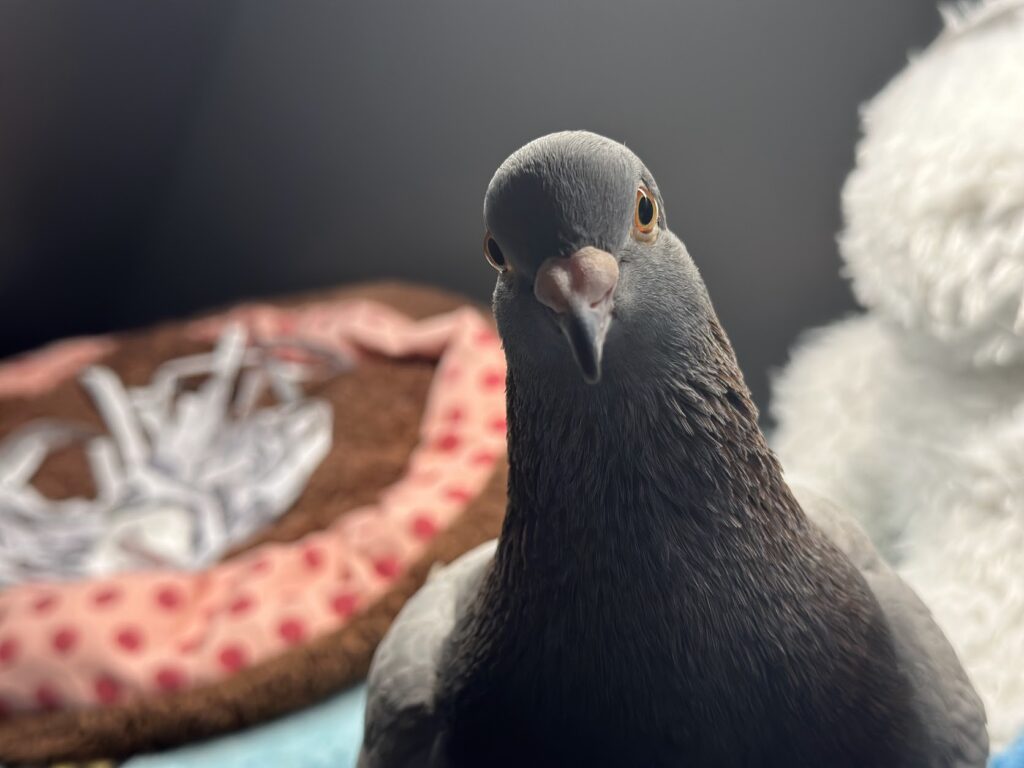
The purpose of pigeon cooing
Pigeons use cooing as a form of communication to express a variety of emotions and intentions. At a basic level, cooing serves as a way for pigeons to communicate with each other and with their human caregivers.
But there are many different meanings behind different types of pigeon coos (or pigeon cooing sound), depending on the context and the individual bird.
Main reasons pigeons coo
Here are just a few examples of the meanings behind different types of pigeon coos:
- Territorial defense: Pigeons are highly territorial creatures and will coo loudly to warn off potential intruders.
For example, pigeons are highly territorial creatures and will use cooing to defend their territory against intruders. If a pigeon feels threatened or senses a potential rival, it may coo loudly and aggressively to warn off the other bird. This type of cooing is often accompanied by other aggressive behaviors, such as fluffing up the feathers or bobbing the head.
- Courtship behavior: Male pigeons will coo to attract a mate (cooing is their mating song), while female pigeons will coo to signal their interest. Male pigeons to make other pigeons go away and leave their mate alone!
On the other hand, pigeon cooing can also serve as a way for birds to attract a mate. Male pigeons will often coo loudly and persistently to signal their interest in a female, while female pigeons may coo softly and rhythmically to indicate their receptiveness.
- Nesting behavior: Pigeons will coo to indicate their desire to nest and to communicate with their mate about the care of their eggs and chicks.
Pigeons may also use cooing to communicate with their mates about the care of their eggs and chicks, such as when it’s time to incubate or feed the young.
- Comfort and contentment: Pigeons will often coo softly when they are feeling calm and secure. They coo to talk and communicate with other pigeons.
In addition to these more specific functions, pigeon cooing can also be a way for birds to express their overall emotional state.
For example, pigeons may coo softly and consistently when they are feeling calm and content, while they may coo loudly and erratically when they are distressed or agitated.

The Anatomy of Pigeon Cooing
So how do pigeons produce these various cooing sounds? Like most birds, pigeons have vocal cords located in their syrinx, which is the avian equivalent of the larynx in humans. The muscles in the syrinx can be controlled to produce a range of different sounds, from soft coos to loud caws.
Pigeons also have a number of other physical adaptations that help them produce sound, such as their beak, which is shaped to amplify and modulate the sound waves generated by their vocal cords.
Hormones also play a role in regulating pigeon cooing behavior. For example, levels of the hormone testosterone increase in male pigeons during breeding season, which can lead to an increase in cooing as they try to attract a mate. Similarly, female pigeons may produce more coos when they are ready to lay eggs or incubate, as this behavior is often regulated by hormones such as prolactin and oxytocin.
Check this out: Why do pigeons stand on one leg?
The Cultural Significance of Pigeon Cooing
Pigeon cooing has had a range of cultural significance throughout history.
- In some cultures, pigeon cooing has been associated with peace and goodwill.
- For example, in ancient Greece, the pigeon was considered a symbol of Aphrodite, the goddess of love, and was seen as a messenger of peace.
- In other cultures, pigeons have been used as messenger birds to carry messages between distant locations.
- In fact, the term “pigeon post” refers to the use of pigeons to carry messages, which dates back to ancient civilizations such as the Persians and the Romans.
- Pigeons were particularly useful in war time, as they were able to quickly and reliably deliver important messages over long distances, even in difficult or dangerous conditions.
- The cultural significance of pigeon cooing extends beyond just their use as messenger birds, however. In many cultures, pigeons are seen as symbols of peace, love, and prosperity, and their coos are often associated with positive and uplifting emotions.
- For example, in some cultures, pigeon cooing is believed to bring good luck and ward off negative energy, while in others it is seen as a sign of prosperity and abundance.
My pet pigeon Gerard and his cooing sound
As someone who has always been drawn to the beauty and intelligence of pigeons, I can honestly say that there is nothing quite like the sound of a pigeon cooing. Whether it’s the soft, rhythmic coos of a contented bird, or the excited chirps of a playful pigeon, there is something deeply soothing and uplifting about these sounds. And as the owner of my own dear pigeon, Gerard, I can attest to the incredible bond that can be formed through the simple act of cooing.
Gerard is a rescued pigeon who came to live with me after being found in the frost as an abandoned baby almost eaten by predators. From the moment I brought him home, I knew that he was a special bird, and I was determined to do everything in my power to help him heal and thrive. As Gerard recovered, we formed a deep and inseparable bond, and his coos became an integral part of my daily life.
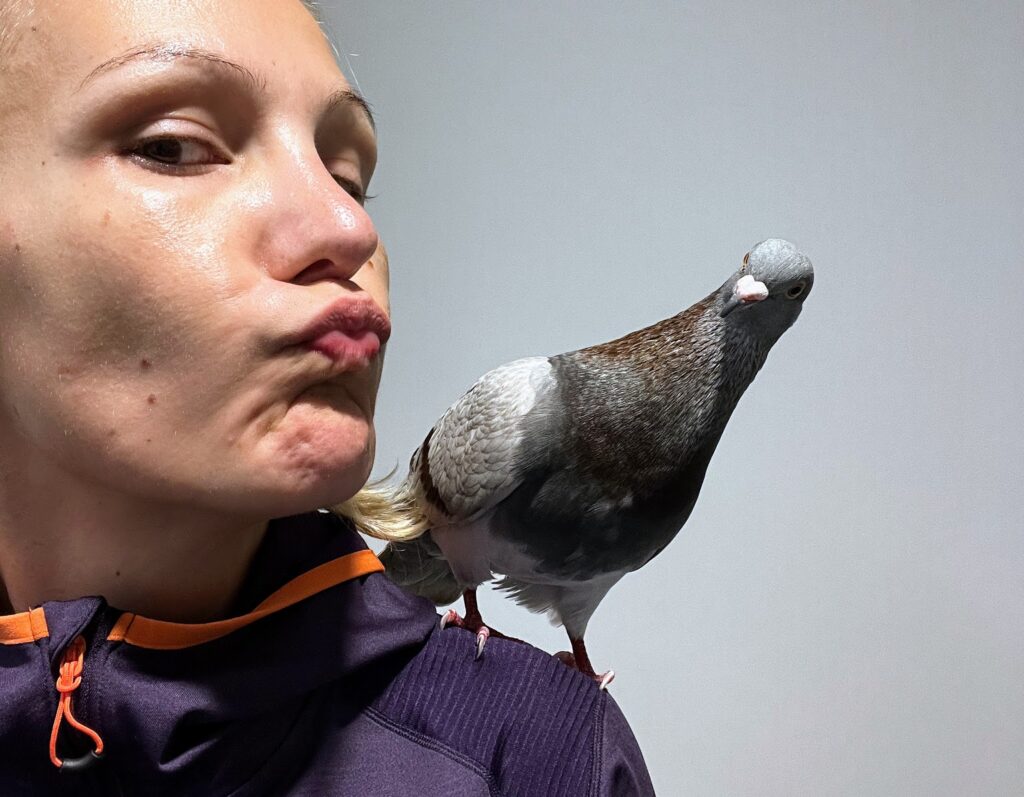
There is something truly magical about the way Gerard coos. When he is feeling happy and content, he will coo softly and rhythmically, almost as if he is singing a lullaby. And when he wants to be fed or is feeling playful, his coos become more excited and insistent, as if he is trying to communicate something important.
But it’s not just the sound of Gerard’s coos that fills me with joy – it’s the way he looks at me when he coos, as if he is trying to express something deep and meaningful. There is a sense of connection and understanding that goes beyond words, and I can’t help but feel touched and moved by the simple act of cooing.
In short, Gerard’s coos are a constant source of joy and comfort for me, and I am deeply grateful to have him as a companion. Whether he is cooing softly as he dozes off to sleep, or chirping excitedly as
Pigeons coo and it is so cool
In conclusion, pigeon cooing serves as an important form of communication and body language for these fascinating birds.
Whether they are defending their territory, courting a mate, or simply expressing their contentment, the various coos of a pigeon can tell us a lot about their emotions and intentions.
And with their cultural significance as symbols of peace and as messenger birds, it’s no wonder that pigeon cooing has captured the hearts of people around the world, myself included.
My dear Gerard has brought so much joy and companionship into my life, and I will always treasure the unique bond that we share through his soothing coos.
Frequently Asked Questions About Pigeon Sounds
Here are some of the most often questions. about the sounds pigeons make and other pigeon noises.
Do pigeons coo constantly?
No, pigeons do not coo constantly. Pigeons will only coo when they are trying to express a specific emotion or intention, such as when they are feeling threatened, seeking a mate, or communicating with their young. The frequency and intensity of pigeon cooing can vary widely depending on the individual bird and the context. Pigeon cooing is most common during the breeding season, when male pigeons are trying to attract a mate and female pigeons are caring for their eggs and chicks, and when pigeons are feeling threatened or distressed. Overall, pigeon cooing is a normal
Does a male pigeon coo more than a female pigeon?
It is not necessarily true that male pigeons coo more than female pigeons. Pigeon cooing behavior can vary widely depending on the individual bird and the context in which the cooing is occurring. In general, both male and female pigeons use cooing as a way to communicate with each other and with their human caregivers, and both genders may coo for a variety of reasons, such as to express their emotions, defend their territory, or attract a mate.
When do baby pigeons start to coo?
It is difficult to pinpoint an exact age at which a baby pigeon will start to coo, as it can vary depending on the individual bird and the specific circumstances. However, most baby pigeons will begin to make soft peeping or chirping sounds as they develop their vocal cords and learn to communicate with their parents and siblings.
In general, most pigeons will start to make distinct cooing sounds as they approach adulthood and become more independent. However, the exact timing can vary and may depend on factors such as the health and development of the individual chick, the presence of other birds or environmental stimuli, and the overall context in which the cooing is occurring.
What other noises do pigeons make?
Pigeons are known for their distinctive cooing sounds, but they are capable of making a wide range of other noises as well. Some other common noises that pigeons make include:
- Cawing: Pigeons will occasionally make a loud, harsh cawing sound, which is often used to communicate alarm or distress.
- Chirping: Pigeons may make a series of soft, high-pitched chirping sounds when they are feeling playful or excited.
- Clucking: Pigeons may make a series of soft, throaty clucking sounds when they are feeling content or relaxed.
- Whistling: Pigeons may make a series of soft, whistling sounds when they are trying to attract a mate or communicate with other birds.
- Hissing: Pigeons may hiss when they are feeling threatened or aggressive, as a way to deter potential predators or rivals.
Check this out: What sound does a pigeon make?

